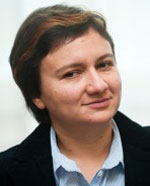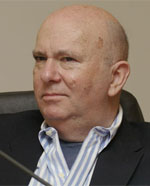Russian Universities Must Become More Attractive to Foreign Lecturers
On January 31, 2014, at the HSE, the first meeting took place of university representatives participating in the global competitiveness programme 5/100. The group discussed the problems of recruiting lecturers from the international labour market.
In May 2012, immediately after his inauguration, Russian President Vladimir Putin signed a decree to support the entrance of at least five Russian universities into the world’s Top 100 leading universities by 2020. Fifteen universities won the competition for public funding in 2013.
.jpg) |
| Yaroslav Kuzminov |
 |
| Maria Yudkevich |
What should Russian universities do to become attractive to international lecturers?
First, they should create an academic environment where international specialists will be able to develop as professionals through interaction with colleagues. They must support academic mobility, organize seminars and conferences, and provide the conditions for research. Decreasing the teaching load would be a big advantage: the international standard is 2-6 hours per week, while Russian lecturers work several times more than that.
 |
| Martin Gilman |
According to Irina Evsyukova, Director of the Project Management Office at the National University of Science and Technology MISIS, her university employed several PostDocs. The experience was a success: the young researchers did a good job, published numerous papers in authoritative journals, and improved their rankings in citation indices.
But most Russian universities are not involved in purposeful recruitment on the international labour market. Foreign lecturers are attracted by certain university departments, which take advantage of their links with international partners. Experience has proven that today this format is inadequate with regards to improving one’s position in international university rankings.
Ekaterina Rylko, specially for the HSE News Service
See also:
HSE is ranked one of the leading Project 5-100 universities
HSE is among the top four universities according to the rating compiled by the Council on Enhancing the Competitiveness of Russia’s Leading Universities.
Universities in Russia and other BRICS countries will cooperate more actively with each other
On December 3, HSE marked ‘Russian Universities’ Day’ – an event held during the BRICS University summit organized by Times Higher Education and the 5/100 Project for Raising the Competitiveness of Russia’s Leading Universities among the top global higher education institutions.
HSE at the BRICS Universities Summit
On 3-4 December 2014 the inaugural BRICS and Emerging Economies Universities Summit will take place in Moscow. On 3 December the HSE will host its ‘Russian Universities Day’.
Russian Universities Need New Rules and Regulations to Get into World Top Rankings
The HSE hosted the second general meeting of members of the Global Universities association on October 8. They discussed issues relating to attracting international students to Russian universities, about possibilities for the accreditation of programmes in new specialties and about the leading universities' conferring degrees.
To Develop the University Has to Change
20th March 2014, at a conference of staff and teachers at the HSE, Rector Yaroslav Kuzminov gave an account of the results of the 2009-2013 HSE Programme for Development. These are the main points of his presentation.
Professor Martin Gilman: Moscow – an Unlikely but Advantageous place to work
Martin Gilman, the Director of Centre for Advanced Studies of the HSE has been the Head of CAS in Moscow since 2006. Today we asked Dr. Gilman about the current situation in the international recruitment of academic staff.


